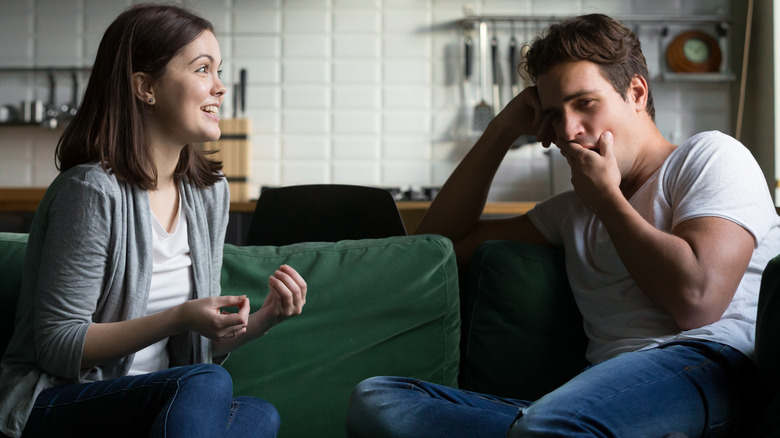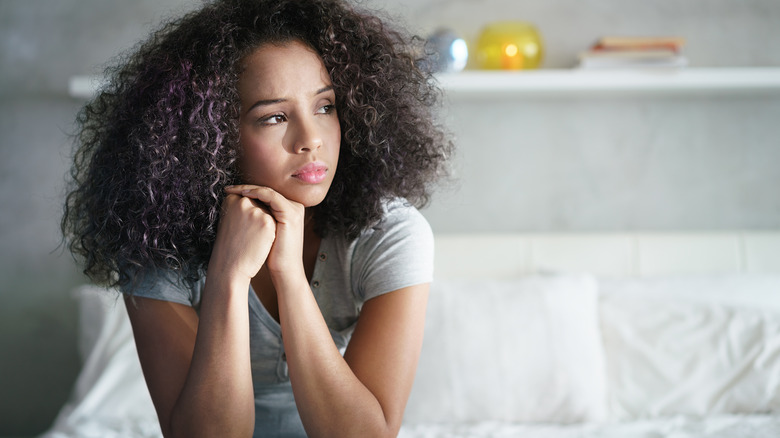How Sleep Loss Might Impact Social Interactions
We often hear that humans need three main elements for survival: food, water, and shelter. However, sleep and social connectedness are also two massively important human needs. Interestingly, science shows us that our quality of sleep and the quality of our social interactions may be more closely intertwined than you'd think.
Not only does having strong social relationships provide us with a sense of belonging, but studies have shown that social connectedness also boosts our physical health in numerous ways. Conversely, research has also shown that lonely individuals experience more inflammation, reduced immunity, and delayed wound healing. Per Nature Communications, lacking in social relationships has also been associated with an increased risk for heart disease and eventual dementia.
Seeing as socialization is so vital to our ability to survive and thrive as humans, it's important to do what we can to foster meaningful relationships, including getting a good night's rest.
Sleep loss can increase feelings of loneliness
A 2018 two-part study published in Nature Communications found that a poor night's rest increases one's feelings of loneliness due to a lessened desire to interact socially, according to the researchers at University of California Berkeley. Interestingly, this phenomenon also appeared to extend to others, with well-rested folks noting an uptick in their own feelings of loneliness after interacting with a sleep-deprived person.
The first part of the experiment involved 18 participants who had either received a thorough night's sleep or undergone a night of sleep deprivation. Using brain imaging technology, the researchers measured participant responses to simulated videos of strangers walking towards them. Participants were asked to click a button when they felt the person in the video was getting too close for comfort. The results showed that participants with poorer quality of sleep kept the simulated individual as much as 60% further away from them compared to when they had received a good night's sleep. In addition, research data showed that during the exercise, brain regions associated with perceived threats were activated in sleep-deprived individuals, while brain regions associated with socializing experienced reduced activity.
A lack of sleep can affect the emotions of those around us
In the second part of the 2018 study, both sleep-deprived participants and well-rested participants were recorded talking about their various opinions and activities on video (per UC Berkeley). 1,000 recruited observers were then asked to indicate how lonely they thought the person in each video was. More often than not, sleep-deprived individuals were perceived by the viewers as lonelier, and the observer reported a lessened desire to interact with them. Even more interestingly, the viewers also reported feeling more lonely themselves after watching just one minute of video of the individuals who had slept less.
But this study isn't the only one that has found sleep deprivation to impact the quality of human interactions. Dr. David Ludden writes via Psychology Today that additional studies have shown an escalation in interpersonal conflict between significant others following a poor night's sleep, due to reduced empathy in both the sleep-deprived individual as well as the well-rested partner. Furthermore, Dr. Ludden explains that research has also shown we are more likely to misinterpret expressions of happiness and anger in others when running on fewer hours of sleep, thereby impacting the quality of our social interactions.
The effect of a good night's sleep on social relationships
Lead author of the UC Berkeley study, Eti Ben Simon, commented on the significance of their findings, publicly stating via UC Berkeley, "It's perhaps no coincidence that the past few decades have seen a marked increase in loneliness and an equally dramatic decrease in sleep duration. Without sufficient sleep we become a social turn-off, and loneliness soon kicks in."
Due to the negative effects that social isolation can have on our physical and mental well-being, the study's senior author Matthew Walker believes loneliness to be a public health crisis. But just as a lack of sleep can be detrimental to our interpersonal health, a good night's sleep can have the equal and opposite impact. Walker elaborates, stating, "On a positive note, just one night of good sleep makes you feel more outgoing and socially confident, and furthermore, will attract others to you."




